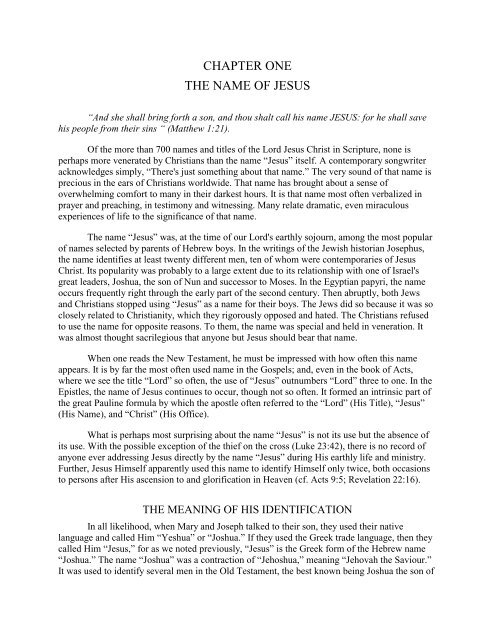The Names of Jesus - Elmer Towns
The Names of Jesus - Elmer Towns
The Names of Jesus - Elmer Towns
- TAGS
- elmer
- towns
- elmertowns.com
You also want an ePaper? Increase the reach of your titles
YUMPU automatically turns print PDFs into web optimized ePapers that Google loves.
CHAPTER ONE<br />
THE NAME OF JESUS<br />
“And she shall bring forth a son, and thou shalt call his name JESUS: for he shall save<br />
his people from their sins “ (Matthew 1:21).<br />
Of the more than 700 names and titles <strong>of</strong> the Lord <strong>Jesus</strong> Christ in Scripture, none is<br />
perhaps more venerated by Christians than the name “<strong>Jesus</strong>” itself. A contemporary songwriter<br />
acknowledges simply, “<strong>The</strong>re's just something about that name.” <strong>The</strong> very sound <strong>of</strong> that name is<br />
precious in the ears <strong>of</strong> Christians worldwide. That name has brought about a sense <strong>of</strong><br />
overwhelming comfort to many in their darkest hours. It is that name most <strong>of</strong>ten verbalized in<br />
prayer and preaching, in testimony and witnessing. Many relate dramatic, even miraculous<br />
experiences <strong>of</strong> life to the significance <strong>of</strong> that name.<br />
<strong>The</strong> name “<strong>Jesus</strong>” was, at the time <strong>of</strong> our Lord's earthly sojourn, among the most popular<br />
<strong>of</strong> names selected by parents <strong>of</strong> Hebrew boys. In the writings <strong>of</strong> the Jewish historian Josephus,<br />
the name identifies at least twenty different men, ten <strong>of</strong> whom were contemporaries <strong>of</strong> <strong>Jesus</strong><br />
Christ. Its popularity was probably to a large extent due to its relationship with one <strong>of</strong> Israel's<br />
great leaders, Joshua, the son <strong>of</strong> Nun and successor to Moses. In the Egyptian papyri, the name<br />
occurs frequently right through the early part <strong>of</strong> the second century. <strong>The</strong>n abruptly, both Jews<br />
and Christians stopped using “<strong>Jesus</strong>” as a name for their boys. <strong>The</strong> Jews did so because it was so<br />
closely related to Christianity, which they rigorously opposed and hated. <strong>The</strong> Christians refused<br />
to use the name for opposite reasons. To them, the name was special and held in veneration. It<br />
was almost thought sacrilegious that anyone but <strong>Jesus</strong> should bear that name.<br />
When one reads the New Testament, he must be impressed with how <strong>of</strong>ten this name<br />
appears. It is by far the most <strong>of</strong>ten used name in the Gospels; and, even in the book <strong>of</strong> Acts,<br />
where we see the title “Lord” so <strong>of</strong>ten, the use <strong>of</strong> “<strong>Jesus</strong>” outnumbers “Lord” three to one. In the<br />
Epistles, the name <strong>of</strong> <strong>Jesus</strong> continues to occur, though not so <strong>of</strong>ten. It formed an intrinsic part <strong>of</strong><br />
the great Pauline formula by which the apostle <strong>of</strong>ten referred to the “Lord” (His Title), “<strong>Jesus</strong>”<br />
(His Name), and “Christ” (His Office).<br />
What is perhaps most surprising about the name “<strong>Jesus</strong>” is not its use but the absence <strong>of</strong><br />
its use. With the possible exception <strong>of</strong> the thief on the cross (Luke 23:42), there is no record <strong>of</strong><br />
anyone ever addressing <strong>Jesus</strong> directly by the name “<strong>Jesus</strong>” during His earthly life and ministry.<br />
Further, <strong>Jesus</strong> Himself apparently used this name to identify Himself only twice, both occasions<br />
to persons after His ascension to and glorification in Heaven (cf. Acts 9:5; Revelation 22:16).<br />
THE MEANING OF HIS IDENTIFICATION<br />
In all likelihood, when Mary and Joseph talked to their son, they used their native<br />
language and called Him “Yeshua” or “Joshua.” If they used the Greek trade language, then they<br />
called Him “<strong>Jesus</strong>,” for as we noted previously, “<strong>Jesus</strong>” is the Greek form <strong>of</strong> the Hebrew name<br />
“Joshua.” <strong>The</strong> name “Joshua” was a contraction <strong>of</strong> “Jehoshua,” meaning “Jehovah the Saviour.”<br />
It was used to identify several men in the Old Testament, the best known being Joshua the son <strong>of</strong>
















